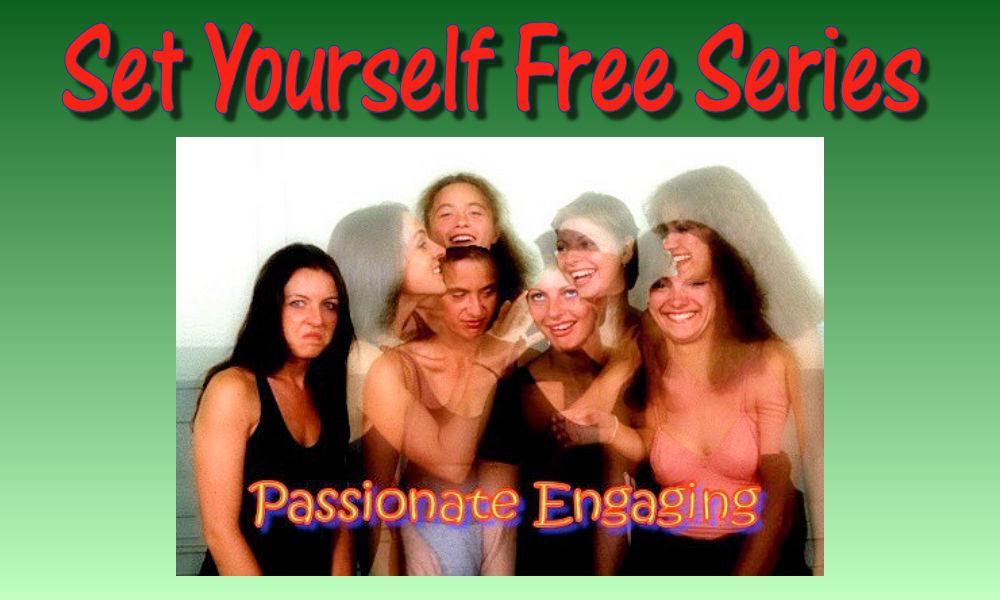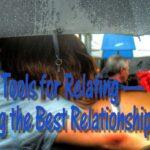- The Prison of Body Resistance — Set Yourself Free Series
- Prisons of the Spirit — Set Yourself Free Series
- The Prison of Imagination — Set Yourself Free Series
- Breaking Through Beliefs — Set Yourself Free Series
- True Intimacy — Set Yourself Free Series
- True Liberation — Set Yourself Free Series
- Learning by Letting Go — Set Yourself Free Series
- Unbinding — Set Yourself Free Series
- Dropping Manipulative Games — Set Yourself Free Series
- Passionate Engaging — Set Yourself Free Series
Passionate Engaging — Learning to engage whole-heartedly requires a surrender into passion and relating.

Simple, profound lessons in relating
The. Best. Relationship. Ever.
Purchase all formats at Amazon
Purchase digital versions (Apple, Nook, Kobo, etc.) from this page
I went in for a chiropractic session recently — I’ve been getting adjustments since I was a baby, and my back likes to get worked in every 3 weeks.
As I was lying there, my mind went on a side trip to all of the chiropractors I’ve been to. Back in 2012, when we were in Costa Rica, I hade quite the time finding one — until I didn’t.
We were in a grocery store, and Dar mentioned my dilemma to the owner of our condo.
It turned out that
- a) there was a chiropractor in town, and
- b) just as she mentioned him, he walked up and said “hi.”
Odd world, eh? Anyway, the adjustment was great.
We were talking the whole time, about living in Costa Rica and generally getting to know each other. There was an interesting moment: given I’ve received adjustments forever, I’m pretty easy to work on.
He had one of my legs in the air, and was slamming into my inner thigh (to pop my SI joint) and it was taking a lot of effort. Finally, I had a big breath, and it popped.
He said, “Hard to let go and let someone new in, right?”
This fits right in to what we’ve been on about for this series: finding the ways and means to stop holding on to what isn’t working, while shifting the only thing we can… our behaviour… to something that gets positive results.

As I think back, I’m remembering what the clients I worked with were able to accomplish, once they gave themselves permission to slide out of their need to plan, to order and understand.
Stunning insights, waves of feeling, all happening within the framework of “making contact” — with me, and more importantly, with themselves.
In the end, it’s never about the context - it’s always about the contact.
It’s oh so easy to look outside of ourselves for what’s going on, to default to old behaviours, to abrogate responsibility for where we are and what we are choosing. I don’t buy it.
In every moment, during every experience, I am choosing what I am doing. I therefore choose to be who I am. I am adult enough to own — to claim — responsibility for every second of my life.
What I’ve noticed is this: we need passion to transform ourselves — and the vehicle, or the laboratory for that transformation is found in our relating. Transformation rests in the action of relating, not in the fact of the relationship, per se.
In the relating, the self is transformed.
Transforming, and relating, are actions, not concepts.
People say, “My relationship is in trouble.” I always respond by asking them to show me their relationship. They look puzzled. I tell them, “There is no relationship… there are your actions, and your partner’s actions, and those actions either get you the results you want, or don’t.” Talking about “the relationship” is a waste of time. Talking about what you are doing… that’s the key.”
Relating like this takes passionate engaging — reaching out, digging deep, being willing to be open and vulnerable. This can be scary or freeing.
Passionate engaging is both deep and profound. This sort of relating is the direct opposite of the safety of mere communication — it requires endlessly moving away from head trips, explanations, and musings about “why” and “what’s right,” to the sharing of the heights and depths of ourselves — the revealing of our pain, our secrets, even our outright strangeness.
In my own patterns of relating, one problematic pattern is wanting to fix things. For example, when Darbella is hurting, I have a burning desire to jump in and make it all better.
This leaping in, at its root, is not about Dar — it’s about me trying to “fix” my discomfort with her pain. To simply sit with her as she explores her pain, or even more difficult, to sit with her as she simply chooses to be in her pain, seems, to that part of me that wants to “fix,” to be impossible.
Until I take a breath.
In that moment of inner focus, I can see my fear of change, fear of pain, emerging. In my fear I choose to forget myself and to turn my attention outward, trying to move the universe so I can be happy.
In this process, which I loudly declare is all about Darbella, I am actually discounting her and her issues.
If I see this, I can begin to choose differently. With effort, I can choose to turn my focus back where it belongs. To me and to my curiosity.
I can choose to be curious about her and her experiences, while being responsible solely for my own.
Often, people end relationships over their fear of intimacy, while the parties involved loudly proclaim that intimacy is what they are seeking. True intimacy, however, is about the opening up of the self for examination and sharing, and the ownership of my process. I must reveal all of it, and especially the parts I wish to hide, or wish I could get rid of.
To quote Ben Wong and Jock McKeen, in The NEW Manual for Life,
In our view, change of the basic personality is not possible. Often, seeking for change is a way of anesthetizing the anxiety of nonbeing that accompanies life. To accept one’s deep structures and tendencies often involves embracing this anxiety. To devote oneself to knowing one’s basic patterns (and accepting the accompanying anxiety) rather than trying to eradicate them, will allow for more self-acceptance, more self-responsibility, a greater inner strength and heightened self esteem… The more thoroughly people know their patterns and tendencies, the more varied, creative and spontaneous they can be. (p. 245)
This knowing of the self, and accepting of the self, presupposes letting others in on what’s going on. Often, we want to hide the dark stuff we consider to be too black for public consumption. Yet it is only in dialog — in the sharing of self — all of the self — that choice becomes available.
It is only after I admit to my games and foibles that I create the intent of doing things in a different way.
Relating, really relating, is difficult. It requires time, focus and commitment to self-revelation. Mostly, when the going gets rough, it requires nothing more than staying present and continuing to speak with curiosity.
Plus a deep willingness to share who you are in that moment of conflict.
Life was never meant to be easy. We are complex creatures, driven by motives and passions that are as old as humanity itself — that link us to generations that came before us.
We bring ourselves, all of us, into our relating. The height of silly would then be to pretend we can hide the parts we judge to be unacceptable. The depth of wisdom is to reveal all, and be witnessed fully, with no cop outs, no pleas of “I don’t know what I’m doing” no excuses, and no running away.
In the end, I choose to relate fully, and to refuse to walk away when the sledding is bumpy. I get it “wrong” as often as I get it “right,” but the challenge, the passion and the joy of seeing myself more deeply, as well as through another’s eyes, makes it all worthwhile.
Passionate Engaging — the only way to achieve depth.





